Issue 30 : 19 May 2019
Talofa Lava, Kia Orana, Malo E Leilei, Tena Koutou, Hello ...
... and welcome to the latest issue of “For The Love Of The Game”, the official e-zine of the New Zealand Amateur Sport Association Inc. We hope you enjoy reading the articles below.
If you have any feedback on this issue, ideas for future articles, or would like to contact the Editor, please click here. And, you are invited to forward the e-zine to others you know, who may be interested in reading it.
If you are interested in applying for membership of the Association, please click here.
This edition of the Association’s newsletter takes a closer look at some of the themes currently in focus across community sport in Japan, following the Editor's recent visit to Asia.
World Cup Pride Belies Participation Modesty ...
Japan is rapidly gearing-up for the Rugby World Cup, with Tournament Organisers now concerned that insufficient beer will be available to quench the thirst of foreign visitors. The prefectural governments in Sapporo (in the far north) and Oita (in the far south), have asked four major brewers to bolster their beer supply systems for fear of bad publicity on social media should the taps run dry.
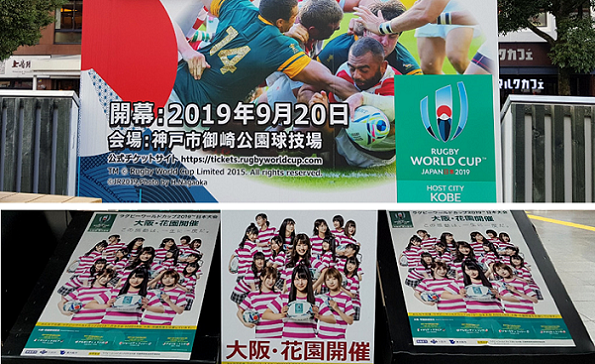
(An appeal for female support is a feature of Rugby World Cup advertising in Osaka)
In Tokyo, there is currently more advertising for the 2020 Olympics than for the Rugby World Cup, although the World Cup commercial opportunity is naturally being maximised, with “Brave Blossoms” merchandise making an appearance in Tokyo’s metropolitan stores.
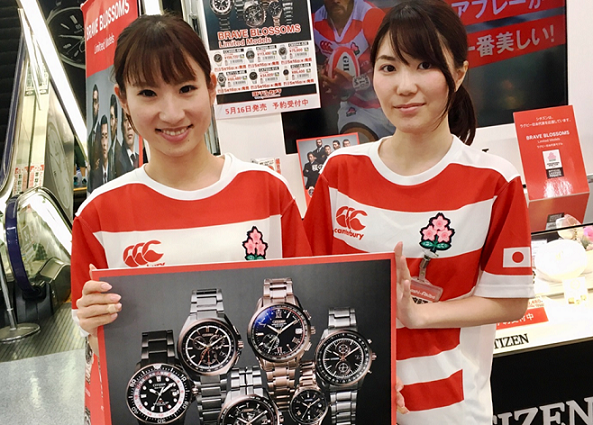
(Stores in Tokyo’s Akihabara district are cashing-in on the Rugby World Cup opportunity)
Elsewhere, there is general awareness (and pride) among local sports-followers that the Rugby World Cup is being hosted by Japan, although few (at least among those that the Editor spoke to while travelling recently throughout Japan) intend to attend matches, despite 70% of total applications for the 1.8 million Tournament tickets reportedly coming from within the country.
Perhaps unsurprisingly, there appears to be even fewer intending to take-up rugby as a sport-of-choice as a result of the Rugby World Cup being hosted by Japan. However there is currently a significant focus in some areas, such as Kyushu, in engaging pre-teens to play non-contact “rippa-rugby”, with World Cup organisers already stating that their participation goal at this level of the game has been exceeded.
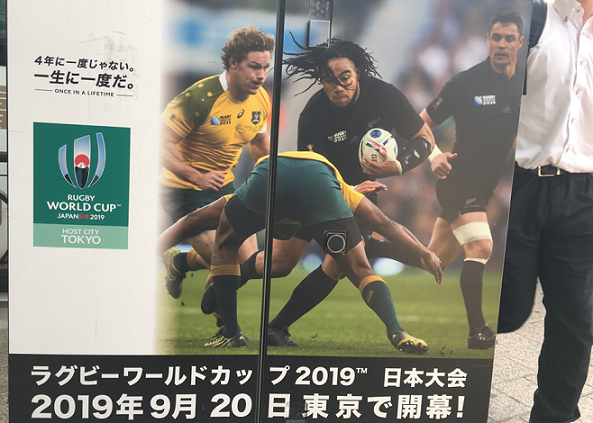
(Ma’a Nonu and Dan Carter appear on a street-side service duct in Tokyo’s Shibuya district)
However, for teenagers the reality is that few high-schools in Japan offer rugby as a sporting choice. Poor facilities are a big part of the problem, with most teams training (and sometimes playing) on largely clay-based, rather than grassed, surfaces. Moreover, the discipline of "training" (relative to "playing") is often seen to provide the greatest benefits within the educational context.
Overall, a combination of the unlikely (and largely unsupported) transition from non-contact to contact versions of the game and the total absence of a national community club structure, means that the Tournament’s legacy (at least in the Editor’s opinion), is unlikely to fundamentally change current community participation in Japan.
Captain Tsubasa Promotes "Community First" ...
In Japan, community team sport continues to be a key factor in promoting and supporting social cohesiveness. The concept of professional path-ways arising from participation is not a factor where community facilities have been created, (often with an element of commercialism) to enable local people to take part in team sport.
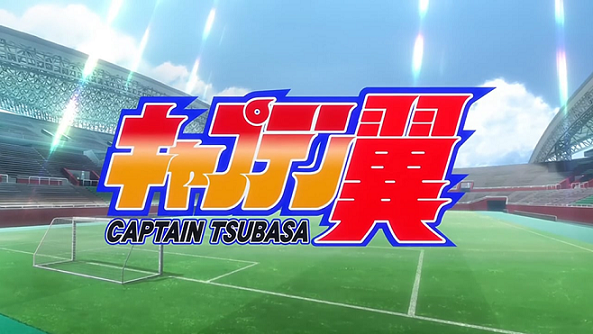
(There are community Captain Tsubasa facilities for futsal in Tokyo and Osaka)
Similarly to New Zealand, futsal as a participation sport has continued grow at a rapid rate in Japan, with a proliferation of new venues in support of this growth. One national organisation, the “Captain Tsubasa Stadium”, emphasises futsal as a means to “friendship”, noting that it aims “to foster [a] healthy mind and body through football and improved personal skills. In addition, while sharing time with friends, we teach the importance of sociality and coordination.”
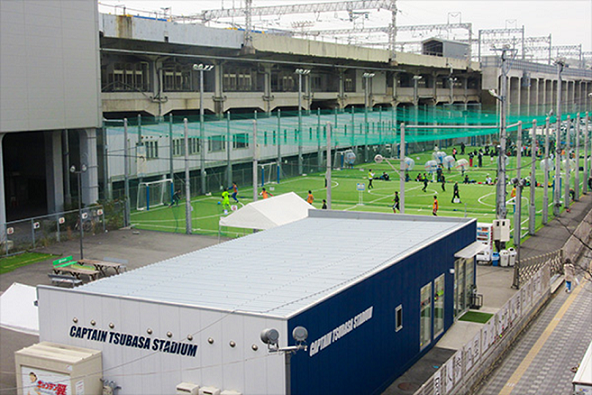
(The Captain Tsubasa futsal facility in Osaka, adjacent to the Shinkansen tracks)
The Captain Tsubasa stadium in Osaka invites casual futsal participants, with strict rules around contact, tackling and aggressive play. Casual participants are unable to join teams if they are unable to respect the community-based goals of the Captain Tsubasa style-of-play.
Sumo Balances Amateur Goals With Professional Code ...
Sumo wrestling is a traditional Japanese discipline, but similar forms of the sport are found in the former Soviet Union and in North and South Korea. Notably in Japan, there is a clear separation between the professional side of sport (known as “ōzumō”) and the amateur sport (known as “amasumo”), with different governing bodies responsible for each.
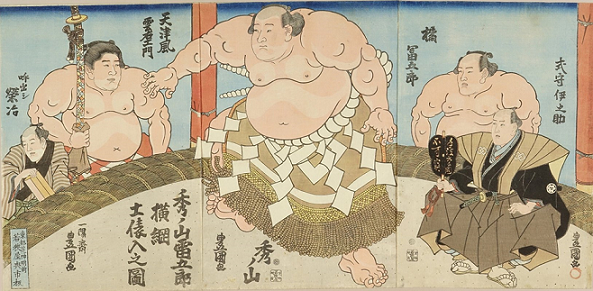
(Amateur sumo ("amasumo") is mainly found in Japanese universities and high schools)
While the latter is admittedly a major recruiting ground for the former, inside the sumo ring itself there are different rules for professionals and amateurs, mainly focused on participant safety, with professional moves such as “harite” (or roundhouse slaps to the head), prohibited in the amateur code.
In “amasumo”, the minimum age at which one can become a “rikishi” (or wrestler) is 15, but there are also amateur competitions for children as young as three and four. Women can also compete in amateur sumo, but are barred from setting foot in professional sumo rings.
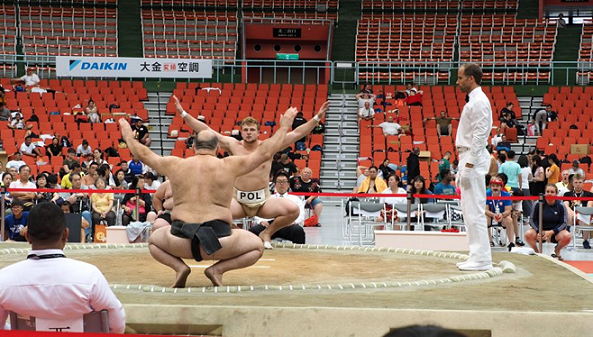
(Most foreign amateur sumo wrestlers come from Mongolia, China and Eastern Europe)
In 1992, the first amateur Sumo World Championships were held, attended by 73 competitors from 25 different countries. Thereafter, the Sumo World Championships have been held annually and the number of amateur participants has continued to increase.
Community Club Tackles Climate Change ...
The United Nations has honoured UK amateur football club, the “Forest Green Rovers” with the UN Climate Action Award, for its efforts to become the world’s first carbon neutral football club.
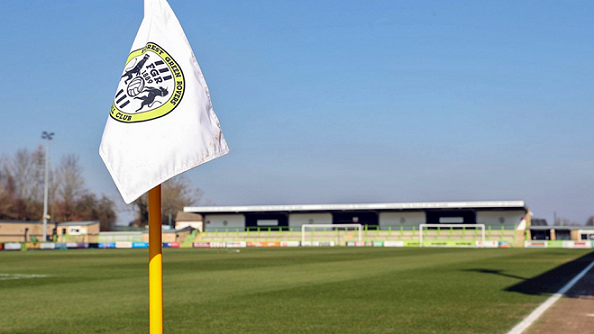
(FGR have been named the world's first UN certified carbon-neutral football club)
The Club’s eco-focus has included the installation of solar panels on the stadium roof, electric vehicle charging points in the carpark and football’s first solar-powered robotic lawnmower, the “mowbot”, which maintains (what is reported to be) the world’s first organic playing field.
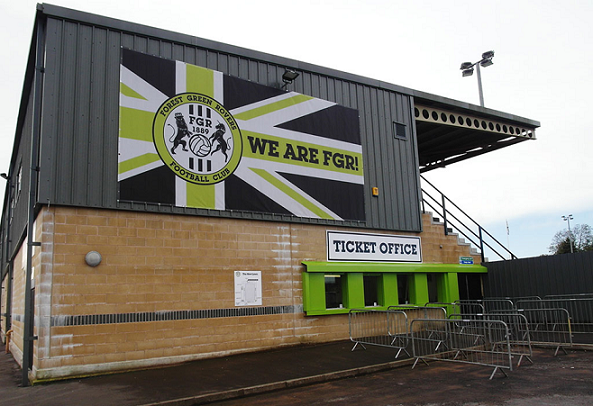
(FGR signed up for a UNFCCC initiative called "Climate Neutral Now")
At home matches, hamburgers and meat pies for Club supporters have been replaced with a vegan menu to eliminate carbon emissions associated with the meat and dairy industry. Arising from the Club’s green initiative which started in 2010, there has been a reported four-fold increase in average attendance at home fixtures.
From The Archives ...
THE AMATEUR
NEW ZEALAND TIMES, VOLUME XLVI, ISSUE 10528, 3 MARCH 1920
“Delegates from sports bodies met in Wellington yesterday afternoon to discuss the much-debated question of amateurism in sport, and the advisability of amending the definition of the term. Mr C. P. Skerrett, chairman of the New Zealand Sports’ Protection League, presided. He also represented the New Zealand Football Association.
Others present were Messrs A. A. Marryatt [New Zealand Amateur Athletic Association), G. W. Slade (New Zealand Rugby Union), B. A. Guise (New Zealand Boxing Association), W. S. Brice (New Zealand Football League), M. J. Crombie (New Zealand Cricket Council), A. E. Schlanders (New Zealand Golf Association), A. D. Bayfield (New Zealand Amateur Rowing Association), G. S. Hill (New Zealand Swimming Association), and Mr R. W. Shallcrass (secretary).
Mr Brice said that the League footballers objected to being called professionals. It was done only by the Rugby people. They expected no sympathy from “Rugbyites”, and knew that the Rugby Union would not alter any rule to benefit the League. There was no doubt that the two games were in opposition. It was very unfair of the Rugby Union to bandy a man’s name all over New Zealand as a “disqualified man” just because he played League.
The League hoped for some consideration from such gatherings as the present. There were League players who considered themselves amateur athletes. Davidson, the hundred yards champion, was a League player. There was an impression that the League paid men to play football. That was not so.”
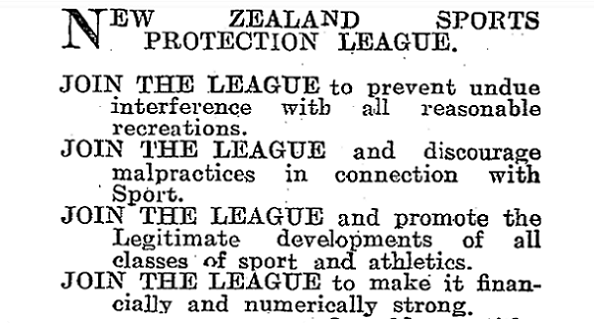
100 years ago, the concept of paid athletes in one sport being ineligible to compete as amateurs in another, was a hot topic. Today, such hard-and-fast distinctions do not apply in most sporting codes, with paid athletes generally competing only in the code of their chosen career. However the discussion is still very much alive in some sports where “professional” and “amateur” competitions intersect to the detriment of amateur participation.
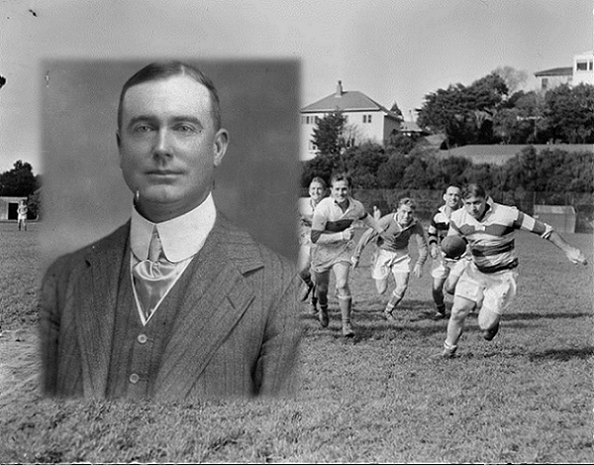
(Charles Perrin Skerrett - President of the New Zealand Sports Protection League)
Outside law, the fifth Chief Justice of New Zealand, Charles Perrin Skerrett's interests were numerous. He was very much an outdoors man, keen on fishing, golf and deerstalking. He took a close interest in horse-racing, and was an enthusiastic polo player, being captain of the Wellington Polo Club and deputy master of the United Hunt Club. He was President of the New Zealand Football Association from 1920 to 1928 and (as noted above), of the New Zealand Sports Protection League.
The Final Word …
“Nana korobi, ya oki”
Translation : “Fall down seven times, get-up eight”
(Japanese Proverb)